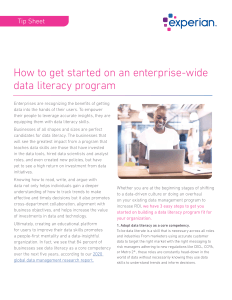Enterprises are recognizing the benefits of getting data into the hands of their users. To empower their people to leverage accurate insights, they are equipping them with data literacy skills.
Businesses of all shapes and sizes are perfect candidates for data literacy. The businesses that will see the greatest impact from a program that teaches data skills are those that have invested in the data tools, hired data scientists and analyst roles, and even created new policies, but have yet to see a high return on investment from data initiatives.
Knowing how to read, write, and argue with data not only helps individuals gain a deeper understanding of how to track trends to make effective and timely decisions but it also promotes cross-department collaboration, alignment with business objectives, and helps increase the value of investments in data and technology.
Ultimately, creating an educational platform for users to improve their data skills promotes a people-first mentality and a data-insightful organization. In fact, we see that 84 percent of businesses see data literacy as a core competency over the next five years, according to our 2020 global data management research report.
Whether you are at the beginning stages of shifting to a data-driven culture or doing an overhaul on your existing data management program to increase ROI, we have 3 easy steps to get you started on building a data literacy program fit for your organization.
1. Adopt data literacy as a core competency.
To be data literate is a skill that is necessary across all roles and industries From marketers using accurate customer data to target the right market with the right messaging to risk managers adhering to new regulations like CECL, CCPA, or Metro 2® , these roles are constantly head-down in the world of data without necessarily knowing they use data skills to understand trends and inform decisions.
Skills like critical thinking, communication, and analyzing trends are necessary tactics to read, write, and argue with data. By looking for these top skills, you can begin to develop your team’s skill set and hire for these skills to acquire more data-insightful minds, ultimately putting your enterprise on a path toward a data-driven culture.
To operate as a data-literate organization and adopt data literacy as a core competency, start by asking yourself these questions:
1. Who should teach your data literacy program? Do you have IT or data experts that could teach business users?
2. Which department need to develop their data skills?
3. How do you want to teach data literacy? Do you think an informal or formal training would resonate better with your teams?
When you think about data literacy skills as a core competency within your organization, look to invest in your current employees to reshape their mindset to be data disciplines and then think about hiring for these skills in new roles to make the next generation of your organization already data insightful.
2. Invest in technology that fits your operation.
When you have the right technology paired with a data literacy program, you can help your students visualize data management, helping them see the inflow, monitoring, and execution of the records within the database. When business users of all kinds are managing data within a centralized location, they can gain the benefits of alignment across the business and cross-collaboration.
Investing in the right technology will help operational efficiency, risk management, and more. The key is to implement a user-friendly tool that will be easily adopted by all your data users, not just techs. Think about a data quality management software that connects to multiple databases, has shareable workflows, and secure, administrative rights.
3. Create a compelling data story.
It’s true that quality insights help inform effective business decisions, like how to position you brand in a new market or target a new demographic. However, when you are looking for leadership buy-in on your business objectives, you need to be able to tell a compelling story around the evidence and why the insights prove this move is the right one to make.
“A lack of data storytelling related to the full impact of poor data has caused organizations to underinvest in these areas and not fully understand the impact,” says Erin Haselkorn, head of market research of Data Quality, Experian NA in our 2020 Global data management research report.
With data literacy skills at the forefront of users’ minds, they’ll be able to present on key business initiatives while using powerful and accurate data to tell the story. Not only will teams get leadership buy-in for business projects, but they will also continue to invest in data quality management practices.
Data literacy skills are the key to shifting to data-driven culture and seeing ROI on data management initiatives. Why? When strong data skills are supported by the right tools, every business will be supported by evidence to inform decisions and steer you toward growth.



